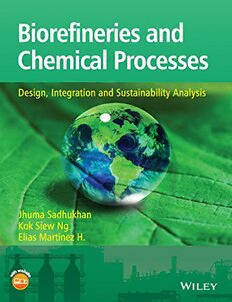Table Of ContentBiorefineries and
Chemical Processes
Design, Integration and Sustainability Analysis
Jhuma Sadhukhan
Kok Siew Ng
Elias Martinez H.
Biorefineries and Chemical Processes
Biorefineries and Chemical Processes
Design, Integration and Sustainability Analysis
JHUMASADHUKHAN
CentreforEnvironmentalStrategy,UniversityofSurrey,UK
KOKSIEWNG
CentreforProcessIntegration,UniversityofManchester,UK
ELIASMARTINEZHERNANDEZ
CentreforEnvironmentalStrategy,UniversityofSurrey,UK
Thiseditionfirstpublished2014
©2014JohnWiley&Sons,Ltd
Registeredoffice
JohnWiley&SonsLtd,TheAtrium,SouthernGate,Chichester,WestSussex,PO198SQ,UnitedKingdom
Fordetailsofourglobaleditorialoffices,forcustomerservicesandforinformationabouthowtoapplyforpermissiontoreusethecopyrightmaterialin
thisbookpleaseseeourwebsiteatwww.wiley.com.
TherightoftheauthortobeidentifiedastheauthorofthisworkhasbeenassertedinaccordancewiththeCopyright,DesignsandPatentsAct1988.
Allrightsreserved.Nopartofthispublicationmaybereproduced,storedinaretrievalsystem,ortransmitted,inanyformorbyanymeans,electronic,
mechanical,photocopying,recordingorotherwise,exceptaspermittedbytheUKCopyright,DesignsandPatentsAct1988,withoutthepriorpermission
ofthepublisher.
Wileyalsopublishesitsbooksinavarietyofelectronicformats.Somecontentthatappearsinprintmaynotbeavailableinelectronicbooks.
Designationsusedbycompaniestodistinguishtheirproductsareoftenclaimedastrademarks.Allbrandnamesandproductnamesusedinthisbookare
tradenames,servicemarks,trademarksorregisteredtrademarksoftheirrespectiveowners.Thepublisherisnotassociatedwithanyproductorvendor
mentionedinthisbook.
LimitofLiability/DisclaimerofWarranty:Whilethepublisherandauthorhaveusedtheirbesteffortsinpreparingthisbook,theymakenorepresentations
orwarrantieswithrespecttotheaccuracyorcompletenessofthecontentsofthisbookandspecificallydisclaimanyimpliedwarrantiesofmerchantability
orfitnessforaparticularpurpose.Itissoldontheunderstandingthatthepublisherisnotengagedinrenderingprofessionalservicesandneitherthe
publishernortheauthorshallbeliablefordamagesarisingherefrom.Ifprofessionaladviceorotherexpertassistanceisrequired,theservicesofa
competentprofessionalshouldbesought
Theadviceandstrategiescontainedhereinmaynotbesuitableforeverysituation.Inviewofongoingresearch,equipmentmodifications,changesin
governmentalregulations,andtheconstantflowofinformationrelatingtotheuseofexperimentalreagents,equipment,anddevices,thereaderisurgedto
reviewandevaluatetheinformationprovidedinthepackageinsertorinstructionsforeachchemical,pieceofequipment,reagent,ordevicefor,among
otherthings,anychangesintheinstructionsorindicationofusageandforaddedwarningsandprecautions.ThefactthatanorganizationorWebsiteis
referredtointhisworkasacitationand/orapotentialsourceoffurtherinformationdoesnotmeanthattheauthororthepublisherendorsestheinformation
theorganizationorWebsitemayprovideorrecommendationsitmaymake.Further,readersshouldbeawarethatInternetWebsiteslistedinthisworkmay
havechangedordisappearedbetweenwhenthisworkwaswrittenandwhenitisread.Nowarrantymaybecreatedorextendedbyanypromotional
statementsforthiswork.Neitherthepublishernortheauthorshallbeliableforanydamagesarisingherefrom.
LibraryofCongressCataloging-in-PublicationData
Sadhukhan,Jhuma,author.
Biorefineriesandchemicalprocesses:design,integrationandsustainabilityanalysis/JhumaSadhukhan,KokSiewNg,EliasMartinezHernandez.
pagescm
Includesindex.
ISBN978-1-119-99086-4(paperback)
1.Biomass–Refining.2.Biomasschemicals–Technologicalinnovations.3.Biomasschemicalsindustry.4.Biomassenergyindustries–Environmental
aspects.I.Ng,KokSiew,author.II.Hernandez,EliasMartinez.III.Title.
TP155.2.E58S342014
662′.88–dc23
2013049101
AcataloguerecordforthisbookisavailablefromtheBritishLibrary.
ISBN:9781119990864
Setin9/11ptTimesbyAptaraInc.,NewDelhi,India
Contents
Preface xiii
Acknowledgments xvii
AbouttheAuthors xxi
CompanionWebsite xxiii
Nomenclature xxv
I INTRODUCTION 1
1 Introduction 3
1.1 FundamentalsoftheBiorefineryConcept 3
1.1.1 BiorefineryPrinciples 3
1.1.2 BiorefineryTypesandDevelopment 4
1.2 BiorefineryFeaturesandNomenclature 5
1.3 BiorefineryFeedstock:Biomass 7
1.3.1 ChemicalNatureofBiorefineryFeedstocks 8
1.3.2 FeedstockCharacterization 10
1.4 ProcessesandPlatforms 12
1.5 BiorefineryProducts 15
1.6 OptimizationofPreprocessingandFractionationforBioBasedManufacturing 18
1.6.1 BackgroundofLignin 26
1.7 ElectrochemistryApplicationinBiorefineries 31
1.8 IntroductiontoEnergyandWaterSystems 34
1.9 EvaluatingBiorefineryPerformances 36
1.9.1 PerformanceIndicators 36
1.9.2 LifeCycleAnalysis 38
1.10 Chapters 38
1.11 Summary 38
References 39
II TOOLS 43
2 EconomicAnalysis 45
2.1 Introduction 45
2.2 GeneralEconomicConceptsandTerminology 46
2.2.1 CapitalCostandBatteryLimits 46
2.2.2 CostIndex 46
2.2.3 EconomiesofScale 47
2.2.4 OperatingCost 48
vi Contents
2.2.5 CashFlows 49
2.2.6 TimeValueofMoney 49
2.2.7 DiscountedCashFlowAnalysisandNetPresentValue 50
2.2.8 ProfitabilityAnalysis 52
2.2.9 LearningEffect 53
2.3 Methodology 54
2.3.1 CapitalCostEstimation 54
2.3.2 ProfitabilityAnalysis 55
2.4 CostEstimationandCorrelation 55
2.4.1 CapitalCost 55
2.4.2 OperatingCost 58
2.5 Summary 59
2.6 Exercises 60
References 61
3 HeatIntegrationandUtilitySystemDesign 63
3.1 Introduction 63
3.2 ProcessIntegration 64
3.3 AnalysisofHeatExchangerNetworkUsingPinchTechnology 65
3.3.1 DataExtraction 66
3.3.2 ConstructionofTemperature–EnthalpyProfiles 69
3.3.3 ApplicationoftheGraphicalApproachforEnergyRecovery 76
3.4 UtilitySystem 83
3.4.1 ComponentsinUtilitySystem 83
3.5 ConceptualDesignofHeatRecoverySystemforCogeneration 88
3.5.1 ConventionalApproach 88
3.5.2 HeuristicBasedApproach 88
3.6 Summary 91
References 91
4 LifeCycleAssessment 93
4.1 LifeCycleThinking 93
4.2 PolicyContext 96
4.3 LifeCycleAssessment(LCA) 96
4.4 LCA:GoalandScopeDefinition 100
4.5 LCA:InventoryAnalysis 104
4.6 LCA:ImpactAssessment 111
4.6.1 GlobalWarmingPotential 114
4.6.2 LandUse 115
4.6.3 ResourceUse 119
4.6.4 OzoneLayerDepletion 121
4.6.5 AcidificationPotential 123
4.6.6 PhotochemicalOxidantCreationPotential 126
4.6.7 AquaticEcotoxicity 127
4.6.8 EutrophicationPotential 127
4.6.9 Biodiversity 128
4.7 LCA:Interpretation 128
4.7.1 Stand-AloneLCA 128
4.7.2 AccountingLCA 129
4.7.3 ChangeOrientedLCA 129
4.7.4 AllocationMethod 129
Contents vii
4.8 LCIAMethods 130
4.9 FutureR&DNeeds 145
References 145
5 DataUncertaintyandMulticriteriaAnalyses 147
5.1 DataUncertaintyAnalysis 147
5.1.1 DominanceAnalysis 148
5.1.2 ContributionAnalysis 149
5.1.3 ScenarioAnalysis 151
5.1.4 SensitivityAnalysis 153
5.1.5 MonteCarloSimulation 154
5.2 MulticriteriaAnalysis 159
5.2.1 EconomicValueandEnvironmentalImpactAnalysisofBiorefinerySystems 160
5.2.2 SocioeconomicAnalysis 163
5.3 Summary 165
References 165
6 ValueAnalysis 167
6.1 ValueonProcessing(VOP)andCostofProduction(COP)ofProcessNetworkStreams 168
6.2 ValueAnalysisHeuristics 172
6.2.1 DiscountedCashFlowAnalysis 173
6.3 StreamEconomicProfile 175
6.4 ConceptofBoundaryandEvaluationofEconomicMarginofaProcessNetwork 175
6.5 StreamProfitabilityAnalysis 176
6.5.1 ValueAnalysistoDetermineNecessaryandSufficientConditionforStreamstobe
ProfitableorNonprofitable 181
6.6 Summary 187
References 187
7 CombinedEconomicValueandEnvironmentalImpact(EVEI)Analysis 189
7.1 Introduction 189
7.2 EquivalencyBetweenEconomicandEnvironmentalImpactConcepts 190
7.3 EvaluationofStreams 196
7.4 EnvironmentalImpactProfile 200
7.5 ProductEconomicValueandEnvironmentalImpact(EVEI)Profile 201
7.6 Summary 204
References 205
8 Optimization 207
8.1 Introduction 207
8.2 LinearOptimization 208
8.2.1 Step1:RewritinginStandardLPFormat 210
8.2.2 Step2:InitializingtheSimplexMethod 211
8.2.3 Step3:ObtaininganInitialBasicSolution 212
8.2.4 Step4:DeterminingSimplexDirections 212
8.2.5 Step5:DeterminingtheMaximumStepSizebytheMinimumRatioRule 213
8.2.6 Step6:UpdatingtheBasicVariables 214
8.3 NonlinearOptimization 218
8.3.1 GradientBasedMethods 219
8.3.2 GeneralizedReducedGradient(GRG)Algorithm 226
viii Contents
8.4 MixedIntegerLinearorNonlinearOptimization 239
8.4.1 BranchandBoundMethod 240
8.5 StochasticMethod 243
8.5.1 GeneticAlgorithm(GA) 244
8.5.2 Non-dominatedSortingGeneticAlgorithm(NSGA)Optimization 246
8.5.3 GAinMATLAB 248
8.6 Summary 248
References 248
III PROCESSSYNTHESISANDDESIGN 251
9 GenericReactors:ThermochemicalProcessingofBiomass 253
9.1 Introduction 253
9.2 GeneralFeaturesofThermochemicalConversionProcesses 254
9.3 Combustion 257
9.4 Gasification 258
9.4.1 TheProcess 258
9.4.2 TypesofGasifier 260
9.4.3 DesignConsiderations 260
9.5 Pyrolysis 262
9.5.1 WhatisBio-Oil? 262
9.5.2 HowIsBio-OilObtainedfromBiomass? 264
9.5.3 HowFastPyrolysisWorks 265
9.6 Summary 270
Exercises 270
References 270
10 ReactionThermodynamics 271
10.1 Introduction 271
10.2 FundamentalsofDesignCalculation 272
10.2.1 HeatofCombustion 272
10.2.2 HigherandLowerHeatingValues 276
10.2.3 AdiabaticFlameTemperature 278
10.2.4 TheoreticalAir-to-FuelRatio 279
10.2.5 ColdGasEfficiency 280
10.2.6 HotGasEfficiency 281
10.2.7 EquivalenceRatio 281
10.2.8 CarbonConversion 282
10.2.9 HeatofReaction 282
10.3 ProcessDesign:SynthesisandModeling 282
10.3.1 CombustionModel 282
10.3.2 GasificationModel 283
10.3.3 PyrolysisModel 289
10.4 Summary 291
Exercises 291
References 292
11 ReactionandSeparationProcessSynthesis:ChemicalProductionfromBiomass 295
11.1 ChemicalsfromBiomass:AnOverview 296
11.2 BioreactorandKinetics 297

